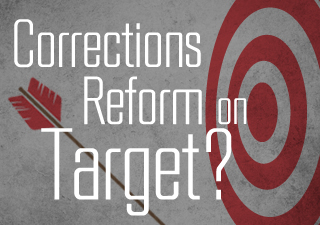Commentary

Don’t Fire Arrows without Arrowheads in Corrections Reform
Pennsylvania is on the verge of landmark legislation to replace decades of ineffective and expensive corrections policies with reforms that make our communities safer and save taxpayers money.
Gov. Corbett recently signed Senate Bill 100, now Act 122 of 2012, which will save millions in our criminal justice system through common-sense reforms. However, a separate component, House Bill 135, which reinvests a portion of these savings, needs to accompany the reforms. Without the complete package, legislators will just be firing arrows without powerful policy arrowheads which will result in these efforts falling painfully short of the reform target.
Nearly 90 percent of offenders who are committed to state prison eventually return to communities. Unfortunately, nearly half of these released inmates will return to prison within three years. We must and can stop this cycle.
To address this issue, national corrections reform experts and state shareholders came together to form a working group, known as the Justice Reinvestment Initiative, which generated broad bipartisan support for a reform package that would make the corrections system more efficient by improving the parole process and keeping low-risk cases out of prison in favor of less expensive and more effective sentencing. On top of saving taxpayer dollars, these measures would improve public safety by reducing the number of offenders who return to prison. Moreover, by reinvesting a portion of that savings back into the system, Pennsylvania can bolster county corrections, law enforcement and parole supervision.
To understand the importance of these reforms, consider the case of a former prisoner we’ll call Max. Max was paroled in July of 2011 after serving a year in prison. But he was placed on a waiting list because there was no room in a substance abuse program, and remained in prison an additional three months. This delay cost taxpayers an extra $1,900. Unfortunately, there are hundreds of cases like Max’s.
As part of a broad coalition of organizations supporting corrections reform that would lower costs to taxpayers and reduce crime, the Commonwealth Foundation supported Act 122, which includes part of the working group’s recommendations.
Act 122 initiates smarter sentencing and parole practices that will save the commonwealth more than $1 million in fiscal year 2012-13 with substantial savings in subsequent years. It also establishes a comprehensive program to reduce recidivism and ensure offenders are better equipped to return to their communities.
But notably, the Justice Reinvestment recommendations were split into two separate pieces of legislation, with only the policy changes included in Act 122. The second half of the recommendations are intended to be included in House Bill 135, which is currently in the Senate Appropriations Committee. This legislation will reinvest a portion of the savings into effective corrections-related programs and to counties to help reduce Pennsylvania’s prison population.
One of the recommendations would provide funding to counties to keep nonviolent offenders with short minimum sentences in local jails, which cost taxpayers less, instead of state prisons. Without HB 135, there’s no funding to do this.
Additionally, HB 135 funds evidence-based probation supervision practices, such as programs modeled after Hawaii’s Opportunity Probation with Enforcement (HOPE). This innovative probation program provides swift, predictable sanctions on probation violators. It reduced positive drug tests in Hawaii by more than 70 percent and cut new arrests in half. Without the funding under HB 135, few counties are likely to utilize HOPE courts.
As a package, these reforms would save taxpayers $253 million within five years. Failing to pass the companion piece limits Act 122’s effectiveness and delays significant savings.
States such as New York and Texas have embraced similar policy changes, significantly reducing both their crime and imprisonment rates over the past decade. These states demonstrate that corrections reform can improve public safety while saving tax dollars.
Reforming our state corrections system is not being soft on crime—it is being smart on crime. To achieve transformative corrections reform, lawmakers should finish this critical legislative package and build on the historic achievements they’ve already made.
# # #
Katrina Currie is a policy analyst with the Commonwealth Foundation (www.CommonwealthFoundation.org), Pennsylvania’s free-market think tank.